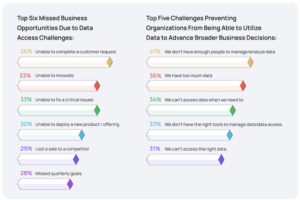A new report from Immuta found that 89% of organizations report missing business opportunities because of data access bottlenecks.
Immuta’s third annual “State of Data Engineering Survey” spotlights top data engineering challenges to uncover their tangible impacts for businesses striving to be driven by their data. The organizations surveyed reported only using an average of 58% of their data in decision making, attributing data security and access challenges as major setbacks. Many data professionals reported a lack of visibility in data access controls and how they correlate with data security, and 90% admitted having a need to better understand how these aspects are associated.
 Over half of respondents (54%) said that securing data with appropriate access rights is one of their biggest hurdles. Another key finding is that while almost 60% believe their organizations should be placing extra emphasis on data security, only 39% consider data access to be part of data security, Immuta says. Data engineers disclosed that this disconnect between security and access is taking its toll, as 40% reported managing data access left them feeling burnt out. It’s also placing companies at an increased risk for data exposure incidents and breaches, the report warns.
Over half of respondents (54%) said that securing data with appropriate access rights is one of their biggest hurdles. Another key finding is that while almost 60% believe their organizations should be placing extra emphasis on data security, only 39% consider data access to be part of data security, Immuta says. Data engineers disclosed that this disconnect between security and access is taking its toll, as 40% reported managing data access left them feeling burnt out. It’s also placing companies at an increased risk for data exposure incidents and breaches, the report warns.
“As data moves from on-premises to the cloud, this clear disconnect between data security and access not only hurts organizations’ data-driven initiatives and business outcomes, but also increases their risk of data leaks and breaches,” said Matthew Carroll, CEO of Immuta. “To better support data teams when it comes to bridging these disconnects, CISOs need to step in and become more of an enabler of the modern data stack. This will require security and data leaders to work more closely with their teams to prioritize balancing security and access effectively.”
Cloud environments are complicating data access as many businesses have accelerated migration to the cloud since the pandemic, the report says, and the decentralized nature of the cloud lessens visibility into what data exists and who is accessing it. Immuta anticipates cloud adoption will continue growing, with 68% of data and IT teams reporting they expect their organizations to house more than two-thirds of their data in the cloud by 2024.
Despite this high adoption, respondents are feeling the squeeze when it comes to data management resources for their cloud environments, as 41% say they are understaffed with insufficient teams for managing and analyzing data, and 36% reported being swamped with more data than they can handle because of this. Data access challenges are leading to missed business opportunities, said 89%.
The lack of proper data management tools to streamline and simplify data access was also cited as a contribution to engineer burnout: “Modern cloud data infrastructure from the likes of Snowflake and Databricks have made it much easier for organizations to move data into a data lake or warehouse,” the report states. “As a result, more data is accessible to more users, and data teams can immediately start joining data sets to gather insights. However, this creates a complex and slippery slope when it comes to securing access—69% of participants report spending an average of six to ten hours per week responding to, managing, and resolving data access issues. That’s 24-40 hours a month, 288-480 hours a year.”
Improving data access with business automation tools may ease these problems, but only 26% of respondents reported employing automation systems. Artificial intelligence and machine learning are often critical components of these systems, and the lack of skilled workers for these systems was cited as the third largest challenge in becoming data driven after data access and security issues.
Immuta says these bottlenecks underscore the importance of having the right people with the right skills and resources in place to ensure that data policy management can keep up with demand, and the report’s findings highlight the delicate balance a data professional must find while managing data access policies.
“In 2023, to support data teams in the criticality of these challenges and disconnects, the role of the CISO will shift by becoming the enabler, not the bottleneck, of the modern data stack,” predicts Carroll. “As the gravity of data shifts to the cloud and the modern data stack becomes mainstream, balancing security and access will become a major priority. This includes refining security policies with the transparency and automated controls required to confidently secure data, while still providing real-time access to data users across the enterprise.”
Related Items:
Immuta Raises $100M Series E as the Latest Data Access Unicorn
Immuta Report Highlights ‘Aspiration Gap’ in Cloud Data Management
Finding the Data Access Governance Sweet Spot
The post Data Access Bottlenecks Lead to Missed Opportunities: Immuta appeared first on Datanami.



0 Commentaires